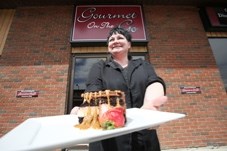“What is gluten?” was the question asked to people who proclaimed to eat a gluten-free diet during a segment for comedian Jimmy Kimmel's TV show. The answers he received ranged from “I don't know,” to “it's what makes you fat.
“What is gluten?” was the question asked to people who proclaimed to eat a gluten-free diet during a segment for comedian Jimmy Kimmel's TV show. The answers he received ranged from “I don't know,” to “it's what makes you fat.”
The segment poked fun at the mass amount of people across the globe who have taken up a gluten-free lifestyle in recent years, but are apparently unaware of what it really means.
Here in Okotoks, restaurant owner and chef Michelle Albert's menu is primarily gluten-free. Albert, who also maintains a gluten-free diet, was one of the 2.4 million YouTube viewers who laughed along at the clip featuring the clueless dieters.
“At first, I was like oh my god that's hilarious, but it's not,” she said. “Some people think it's a diet, a trend or a fad. They don't understand that some people have to live like that.”
To set the record straight, gluten is a protein found in certain grains such as wheat, and it holds bread together and makes it doughy. Unfortunately, according to the Canadian Celiac Association, nearly one in 133 people are affected by celiac disease – a disorder that results in the small intestine being damaged by gluten and left unable to absorb necessary nutrients.
Many people have also been diagnosed with gluten sensitivity, meaning they have negative reactions in their body when they consume gluten. The adverse effects of gluten can range from anemia, diarrhea, weight loss, cramps and bloating.
Albert said she went gluten-free more than 10 years ago after a naturopath suggested it to her.
“I started playing with it and then I noticed my headaches diminishing, and my lethargic feeling, and my bloated stomach pains started to dissipate,” she said. Since then, she has been formally diagnosed with a gluten sensitivity.
Albert said she hadn't originally intended for her restaurant, Gourmet On the Go, to be primarily gluten-free, but many of the dishes turned out that way due to her own dietary restrictions.
“I noticed “hey that's gluten fee, and that's gluten-free,' so I thought I would just throw up on the sign “gluten-free options,' and it's really snowballed from there,” she said. “I didn't realize how important at the time that it would be.”
Albert said aside from her regular customers who stop in to eat, she also gets special requests from Calgary to bake gluten-free cakes to cater to people with dietary issues. Although Albert has mastered the art of cooking and baking gluten-free, she said it wasn't easy.
“I make everything in house, I can tell you exactly what's in everything,” she said. “And they didn't just come out like that, it took a lot of testing and trials. There was a lot of stuff thrown away.
But gluten-free options have come a long way since Albert first started.
“Ten years ago the only place I could go was Lakeview bakery and they had rice bread and it was one of the worse things you've ever tasted,” she said. “Everything was like cardboard and gritty, but you would never know now. The options are amazing now.”
Jacquelin Gates, clinical dietitian with Alberta Health, said there are more gluten-free options available on grocery shelves and in restaurants because of an increase in awareness of celiac disease. In Canada and the United States, May has even been declared as celiac awareness month.
“We've got better testing so we're looking at it more often now as the blood screening test has helped identify more people,” she said. “The incidents of celiac have increased four and a half times in the last 50 years.”
But while its becoming easier and easier to go gluten-free, Gates warns against doing so unless you have been diagnosed by a doctor.
“It's a really good idea to make sure you don't have celiac disease before hand because if you take it out, the testing that is needed to determine celiac disease becomes really difficult,” she said. “The test won't show if you have celiac disease.”
And for those who are hoping to lose some weight by cutting out gluten, Gates said sometimes the opposite can happen.
“Often people will gain weight on a gluten-free diet,” she said. “If you eat a lot of processed gluten-free products and compare the calorie content, some of them are quite high in calories compared to regular bread.”
So unless the doctor says so, Gates recommends maintaining a healthy regular diet.
“I think it's much more difficult to ensure you get the nutrients you require on a gluten-free diet. It takes a lot of care and work to make sure that you're eating a really healthy gluten-free diet,” she said. “It can be very difficult to follow, and it can be very costly.”
